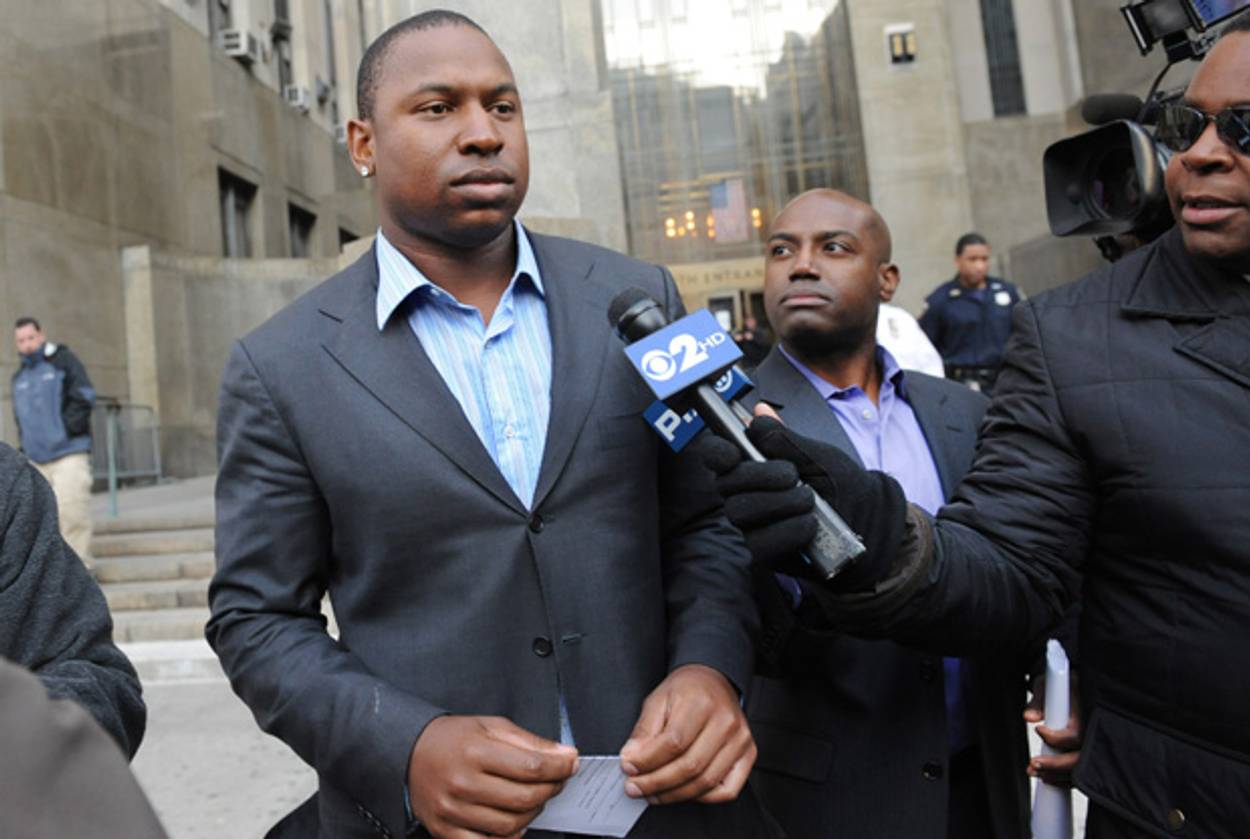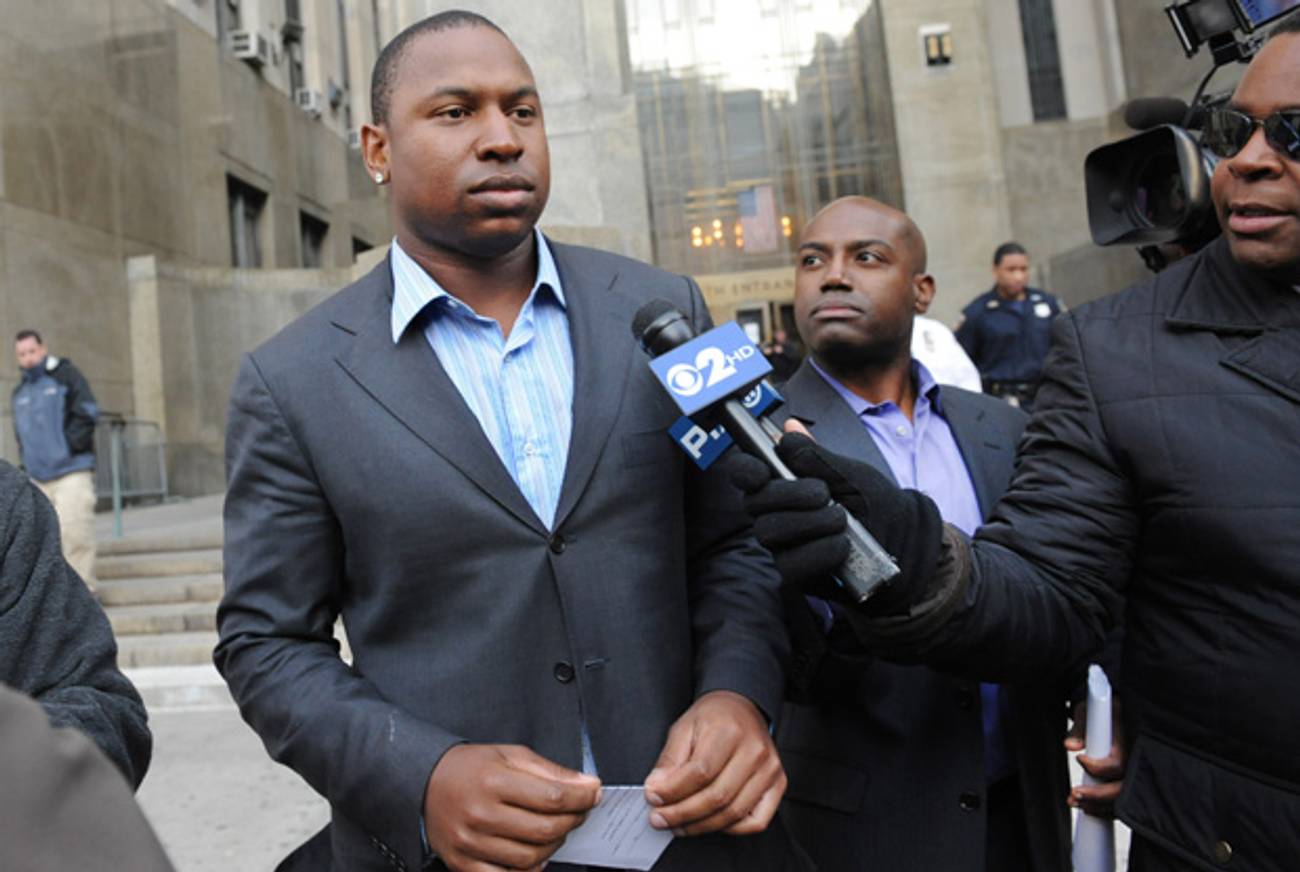Baseball’s Foul Past Returns
Detroit Tigers outfielder Delmon Young’s recent anti-Semitic tirade was a throwback to an era when bigotry was the norm in Major League Baseball




These days, professional sports faux pas generally have to do with fire extinguishers and steroids, so Detroit Tigers outfielder Delmon Young’s recent anti-Semitic tirade shocked even fans used to athletes behaving badly. Just to recap: Last week, Manhattan police said Young was drunk, yelled anti-Semitic slurs (“F—king Jews!”), and attacked a group of tourists outside a Midtown Manhattan hotel in the wee hours of the morning. For his actions, Young received a seven-day suspension from Major League Baseball. (He has apologized, of course, saying in a statement: “I take this matter very seriously and assure everyone that I will do everything I can to improve myself as a person and player.”)
Young’s outburst came as a shock to our 21st-century sensitivities, but Jewish Major Leaguers who played in the early and mid-20th century would not have found Young’s actions out of the ordinary. These players confronted anti-Semitism in bars, from the stands, and from opposing players—and they remember the incidents well.
A Washington Senators pitcher who was getting ribbed for a poor inning during spring training in 1918 responded by blaming his Jewish catcher: “What do you expect when you have this [expletive] Jew, behind the plate?” The Jewish catcher, Bob Berman, remembered his response to the pitcher’s insult: “I put my glove down, took my mask off, my chest protector off, took my shin guards off and I said, ‘Pardon me? What did you say? I didn’t hear you.’ ” The pitcher repeated himself, prompting Berman to lay him out. Berman remembered:
He says, “I didn’t mean it.” I said, “No, he’s gonna apologize. Otherwise, I’m going to beat the living life outta him. Nobody can do what he did to me. I don’t care who he is.” And he was made to apologize. And Walter Johnson [the legendary pitcher] was the one who interfered, nicely. He said, “Thataboy.” And from then on, the word went out, “Leave that kid alone. He’s got the guts to fight, and he’ll fight.”
Prejudice was commonplace and ethnic and religious slurs were uttered regularly in the decades that followed. As Harry Danning, an All-Star catcher who played for the New York Giants in the 1930s and 1940s, described it:
They used to have bench jockeys and they’d call you all kind of names, but usually not to your face. The Italians were “Dagos.” The Jews were “kikes.” In those days, I had a pretty good-sized nose. They used to holler when I was at bat, “Pitch under his nose, he can’t see the ball.” Or they’d say, “Is that your nose, or is that a banana?” And this last one I liked: “He’s the only guy who can smoke a cigar while he’s standing in the shower and not get the cigar wet.” Ha. You gotta laugh. You know they didn’t mean anything by it. That’s just what a bench jockey did. They tried to get your goat.
Not letting every ethnic jab get under your skin was crucial. Mickey Rutner, who had a short stint playing for the Philadelphia Athletics in 1947, generally ignored the hecklers; his co-religionist Cal Abrams, not so much. As Rutner’s wife told me: “Some guys had, you know, rabbit ears and it really bothered them. Like Cal, he heard everything and he reacted to everything. It would eat his gut up, but Mick, he was good at that. Mick would just spit and say, ‘Screw them.’ ”
Al Rosen, 1953’s American League Most Valuable Player and one of the greatest Jewish ballplayers of all time, wasn’t known for laughing off these incidents. An amateur boxer in his youth and a star for the Cleveland Indians, Rosen wasn’t shy about using his fists, and other players knew it. Saul Rogovin, one of Rosen’s contemporaries, remembered one incident involving Rosen when he was on the opposing bench:
So, he grounded out one night, and as he trotted back in front of our dugout somebody yelled, “Well, we got you that time, you ‘Jew bastard,’ ” or something like that, and Al … walked over to our dugout and he said, “That son of a bitch that called me a ‘Jew bastard,’ would he care to say that again?” you know, and everybody was just sitting there, you know. And I had mixed feelings. I felt very funny because here I am, I’m an opposing player and also I’m a Jew, you know. [laughs]
The muscular Judaism that Rosen in particular embodied went a long way toward making American Jews feel at home—and made non-Jewish Americans feel more comfortable with American Jews. Jewish players like Rosen, and Hank Greenberg before him, challenged preconceived notions, similar to what happened when Jackie Robinson and other black players were allowed to play. “Jewish ballplayers, by dint of their sheer physical strength and their willingness to challenge anti-Semites with their fists, also helped shape a changing American Jewish identity,” wrote Peter Levine in Ellis Island to Ebbets Field, his landmark history of American Jews and sports. “They became proud symbols of Jewish survival in a world that daily seemed to threaten Jewish existence.”
By the 1960s and 1970s, the climate had started to change. Future Major Leaguer Ron Blomberg—who holds the distinction of being the first designated hitter ever—remembers teenage teammates in 1960s Atlanta who were members of the Ku Klux Klan. But later, as a minor leaguer in the New York Yankees system, he remembers merely a handful of anti-Semitic letters with swastikas and recalls “the occasional loud-mouthed fan”—and nothing more.
A player who made the Major Leagues much more recently, if only briefly, is testament to how much things have changed. Adam Greenberg, who played for the Chicago Cubs in 2005 and was hit in the head in his only Major League at-bat, recalls teammates on his University of North Carolina team who had never met a Jew before. More than anything else, they were curious, asking Greenberg questions that challenged his own knowledge of Judaism. “So, that was fun, and I always enjoyed that,” Greenberg told me in 2010. “It challenges me too, if I don’t know, I better start knowing.”
***
Like this article? Sign up for our Daily Digest to get Tablet Magazine’s new content in your inbox each morning.
Peter Ephross is the editor of Jewish Major Leaguers in Their Own Words: Oral Histories of 23 Players.
Peter Ephross is the editor of Jewish Major Leaguers in Their Own Words: Oral Histories of 23 Players.